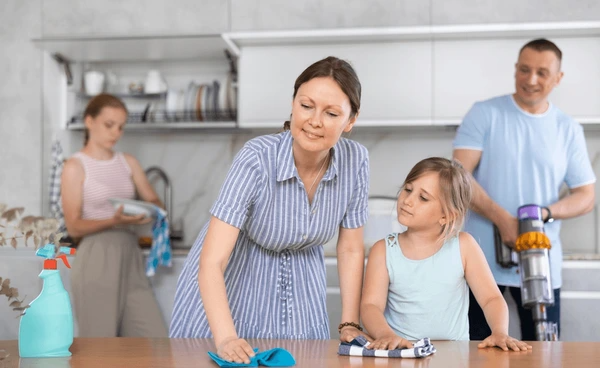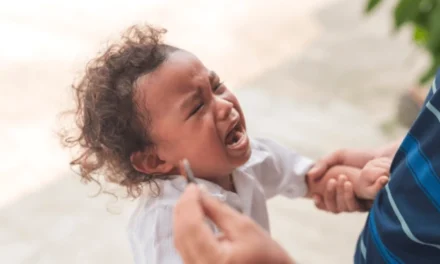Being a parent is special when kids help out at home. It’s amazing to see them grow and feel responsible. Getting kids involved in household tasks is more than just helping. It’s about teaching them important life skills and bringing our family closer together. Let’s start this journey to make your kids more independent and self-assured.
Household tasks might seem boring, but they’re great learning experiences for kids1. The author says teaching kids to do chores is good for families1. Kids can do things like vacuuming, cleaning bathrooms, and cooking dinner. This shows they can learn a lot.
Key Takeaways
- Involving kids in household tasks teaches them essential life skills and fosters responsibility.
- Children can start helping with chores as early as 18 months old2.
- Establishing a routine and providing positive reinforcement can make chores more engaging for kids.
- Gradual progression in chores helps build children’s confidence and skills over time3.
- Encouraging teamwork and cooperation among siblings strengthens family bonds.
The Importance of Teaching Kids Household Tasks
Getting kids involved in household tasks is very beneficial. It helps them learn essential life skills like time management and problem-solving4. They learn to plan, organize, and find creative solutions to problems.
Doing chores also teaches kids responsibility. They see how their actions affect the home4. They learn to prioritize and fulfill their duties.
Developing Essential Life Skills
Household tasks make kids more independent and self-reliant. As they do their chores, they feel more confident4. This helps them not feel entitled and take care of their space.
Building a Sense of Responsibility
Studies show that starting chores early, even at 3, boosts self-esteem and responsibility4. Some kids are naturally eager to help, while others need encouragement4.
Fostering Independence and Self-Reliance
Doing chores helps kids succeed in school, work, and relationships4. It teaches them to work hard, be a team player, and respect household work5.
“Participation in household tasks during childhood was a strong predictor of success in young adults, including positive relationships with family and friends, as per a University of Minnesota study.”6
Teaching kids about household tasks gives them valuable skills for life.
Age-Appropriate Household Tasks

It’s important to give kids chores that fit their age and skills. This helps preschoolers, elementary school-aged children, and teenagers learn important life skills. It also teaches them to be responsible and independent.
Preschoolers (2-5 Years Old)
Toddlers (Ages 2-3) can start with simple tasks. They can put toys away, fill a pet’s food bowl, and help with dusting or wiping baseboards with help7. As they get older, preschoolers (Ages 4-5) can do more. They can make their beds, water plants, and help set the table7. These tasks help them develop their skills and feel responsible.
Elementary School-Aged Children (6-11 Years Old)
Primary schoolers (Ages 6-9) can do tasks like sweeping, loading the dishwasher, and folding laundry7. As they get older, middle schoolers (Ages 10-13) can do more. They can wash dishes, make simple meals, and take out the trash7. These chores help them grow physically and mentally.
Teenagers (12+ Years Old)
High schoolers (Ages 14+) can handle bigger tasks. They can clean the fridge, mow the lawn, and go shopping alone if they have a driver’s license7. These tasks prepare them for adulthood and future responsibilities.
Starting kids with simple chores early and adding more as they grow is key. It teaches them valuable skills, promotes independence, and builds pride and accomplishment8. The right tasks depend on each child’s abilities and maturity.
Getting Kids Started with Household Tasks
Getting kids involved in household tasks is key to their growth. It teaches them important life skills and helps them feel responsible. Leading by example is a top way to introduce these tasks. When parents and caregivers do their chores, they show kids how important it is for everyone9.
Set Clear Expectations and Guidelines
Talking clearly with kids about their tasks is vital. Explain why these tasks matter in a way they can understand. This helps them see their role in the family’s well-being9.
Young kids can start with simple tasks like putting away toys or watering plants10. Older kids can do more, like making their bed or helping with meals10. Teenagers can handle bigger tasks, like laundry or yard work10.
Offering rewards for completing chores can motivate kids. Money, extra privileges, or praise can help them do their tasks well9. This method shows the value of clear rules and keeping promises, not just bribing9.
Starting kids early with household tasks builds responsibility and independence9. It prepares them for the future by teaching them to handle their own tasks9.
Making Household Tasks a Daily Routine

Adding household tasks to a daily routine helps kids feel responsible. Assign chores to specific times, like after school or before bed. This makes a structured space for good habits11.
Starting the day early is very effective. Most people wake up around 5:30 am11. This time is great for tasks like making the bed (2 minutes)11 and cleaning the kitchen counters (5 minutes)11.
Other daily chores, like composting (2 minutes)11 and sweeping (2 minutes)11, round out the routine11. Experts say morning tidying takes 30 to 36 minutes11.
It’s also important to fit tasks into the day. Cheryl Mendelson suggests doing laundry, cooking, and cleaning up12. A regular schedule helps kids feel they own their chores13.
| Household Task | Estimated Time |
|---|---|
| Making the bed | 2 minutes |
| Tidying up kitchen counters | 5 minutes |
| Putting away clean dishes | 7 minutes |
| Composting | 2 minutes |
| Sweeping the floors | 2 minutes |
| Dry mopping the floors | 4 minutes |
| Total time for morning tidying | 30 to 36 minutes |
Consistency is crucial. By making household tasks a daily part of life, kids learn responsibility and ownership13.
Positive Reinforcement and Rewards
Praising and rewarding your kids for their effort in household tasks is powerful. Positive reinforcement motivates them to help willingly and feel proud of their work141516.
Choose rewards that fit your child’s age and likes. For the young, paper stars or a behavior chart work well14. Older kids might like point systems and contract-based rewards14.
It’s important to involve your child in picking rewards that mean something to them1415. Giving small, daily or weekly rewards keeps them excited and motivated14.
Creating a positive and supportive environment is key. Don’t use penalties or demerits as they can discourage. Instead, focus on praise, encouragement, and meaningful rewards14.
As your kids get used to positive behaviors, you can stop giving rewards. This helps them feel responsible and happy about helping out14.
Consistency and encouragement are crucial for positive reinforcement. Focus on your child’s efforts and growth, not just the outcome16. By creating a supportive space and giving meaningful rewards, your kids will look forward to helping out15.
Encouraging Teamwork and Cooperation
Having multiple kids at home can make chores easier if you teach them to work together. Giving them tasks that need teamwork helps share the work. It also shows them the importance of working as a team towards a goal17.
Research shows kids get along better when they have a shared goal18. For advice on teamwork, consider what your child’s preschool or daycare says about their personality18. Activities like puzzles, science, or relay races can also improve teamwork skills18.
To encourage teamwork and cooperation, try these strategies:
- Give chores that need two or more kids, like folding laundry or cleaning a room together.
- Have weekly family meetings to talk about and switch up household tasks. This brings variety and helps build new skills.
- Make chores fun by using games like spinning a paper plate or pulling straws to decide who does what.
- Make chores part of a daily routine. This helps kids know what to do and when17.
By promoting teamwork and cooperation, you can make your home more harmonious and efficient. You also teach your kids important life skills171819.
| Teamwork | Cooperation |
|---|---|
| Working together towards a common goal | Assisting each other to achieve a shared objective |
| Coordinating individual efforts | Communicating and compromising to reach a consensus |
| Sharing responsibility and decision-making | Offering support and resources to one another |
“Teamwork is the ability to work together toward a common vision. The ability to direct individual accomplishments toward organizational objectives. It is the fuel that allows common people to attain uncommon results.”
– Andrew Carnegie
Overcoming Resistance and Reluctance
Getting kids to help with household tasks can be tough. But, with the right approach, you can make it work. Open communication and negotiation are key to teaching them important life skills20.
Open Communication
If your child doesn’t want to help, listen to them. Try to understand their feelings. Don’t just tell them to do it, as that might make things worse20.
Have a real talk with them. Let them share their thoughts and feelings. This way, you can find out why they’re resistant and solve the problem together.
Negotiation
Let your child help decide their chores20. This makes them more likely to do them. Talk things over and find a solution that works for both of you.
This way, they’ll feel more involved and willing to help. It’s a win-win situation.
| Common Reasons for Resistance | Effective Strategies to Address Resistance |
|---|---|
By talking openly and negotiating well, you can help your kids get past their resistance. This way, they’ll learn valuable life skills from helping out at home202122.
Finding the Right Balance
Finding the right balance when giving household tasks to your kids is key. Don’t overload them with too many chores, as it can cause stress23. Think about their age, school, and other activities when deciding how much to ask. This way, you help them learn important life skills without hurting their well-being.
Make a to-do list with the most important tasks first to manage tasks well24. Asking for help from family or work can also reduce stress24. Older kids can help with chores, making the workload more balanced24.
Remember, balancing work and home life is good for your emotional and physical health24. Regular exercise, good food, and enough sleep help manage stress24. Taking time for yourself can improve your work and personal life24. If work-life balance is really off, changing jobs might be needed for your health24.
By finding the right balance, you help your kids feel responsible and self-reliant23. It’s a fine line, but with the right steps, you can empower your kids and make your home a happy place.
| Household Tasks | Benefits |
|---|---|
| Cleaning | Teaches organization and responsibility |
| Laundry | Develops practical life skills |
| Grocery Shopping | Promotes financial awareness and budgeting |
| Meal Preparation | Fosters creativity and healthy eating habits |
“The key to finding balance is to identify the activities you truly love and weave them into your daily routine. This helps maintain a sense of fulfillment and purpose.”
By balancing household tasks with your kids’ other commitments, you teach them important life skills23. It’s a delicate dance, but with the right steps, you can create a harmonious home environment. This sets your kids up for success.
Adapting to Changing Circumstances
In today’s world, change is constant, and household tasks are no exception25. New babies, job changes, or family emergencies often mean we need to rethink our home duties. Being flexible and adaptable helps keep these tasks manageable and stress-free for everyone.
Using a structured plan, like the “Who Does What List” by Dr. John Gottman26, can be very helpful. It promotes talking openly and working together to adjust tasks as needed. This way, family members can find solutions that work for everyone by using “I” statements instead of “You” statements26.
It’s also important to be aware of how we handle stress in our relationships26. Overfunctioning or underfunctioning can affect how we handle home tasks. Recognizing these patterns and making changes can help families deal with changes better.
Adapting to change brings many benefits, like building resilience and improving emotional well-being25. It also helps us grow, solve problems, and feel more confident. On the other hand, resisting change can make us feel stuck and limit our growth25.
To handle changes well, we can take time to process them, change negative thoughts, and take care of ourselves25. Activities like exercise, socializing, or mindfulness can help. Reading books like “When Things Fall Apart” by Pema Chödrön can also offer valuable advice25.
By being adaptable and using different strategies, families can handle changes in household tasks better. This creates a more peaceful home and helps everyone grow and succeed, even when life gets unpredictable.
Fostering a Supportive Environment
When giving feedback on a child’s household tasks, focus on constructive feedback not criticism. Guide them on how to get better and celebrate their progress. This way, they learn from mistakes and grow in a supportive environment27.
Constructive Feedback
Instead of just saying what’s wrong, give feedback that shows how to improve. This helps them grow and learn from their mistakes27.
Praise Effort
It’s important to praise a child’s effort, not just the outcome. Acknowledge their hard work and dedication to chores. This shows the value of their contributions and keeps them positive about household tasks27.
Creating a supportive environment that values constructive feedback and effort helps children. They learn important life skills, become more responsible, and independent27.
| Metric | Impact of Supportive Environment |
|---|---|
| Mental Health Services Utilization | Workers who feel supported at work are less likely to make use of costly mental health services27. |
| Mental Health Outcomes | Social support at work helps guard against depression and anxiety, common reasons for using mental health services27. |
| Health Care Costs | Socially supportive environments at work reduce health care costs as they are linked to various health benefits27. |
| Pregnancy and Childbirth | People with social support at work experience fewer complications during pregnancy and childbirth27. |
| Herpes Outbreaks | Workers with more social contacts are less susceptible to herpes attacks if diagnosed with herpes27. |
| Cardiovascular Health | Socially supported individuals are less likely to experience a heart attack and recover faster from surgeries27. |
| Chronic Condition Management | People reporting social support have better diabetes control and less painful experiences if diagnosed with arthritis27. |
| Longevity | Social support reduces the risk of early mortality, predicting increased life expectancy, especially for women27. |
“Social isolation is a significant risk factor for early death in both animal and human studies.”27
Moreover, social support is a more important predictor of cardiovascular-related health outcomes than factors like blood pressure and obesity27. By creating a supportive environment and praising effort in household tasks, you help your children grow strong and resilient.
Connecting Household Tasks to Real-Life Consequences
It’s key for kids to see that their actions at home have real-life consequences. Teaching them this can change how they see their role in the family28.
Studies show that kids who do chores early do better in life. They tend to do well in school, have good jobs, and make friends easily28. Doing chores or jobs shows they can work hard, which is more important than where they come from28.
If kids don’t do their chores, the house can get messy. But, if they do, the house stays clean and comfy for everyone. This shows them how their work affects the family29.
| Household Task | Consequence of Neglect | Benefit of Completion |
|---|---|---|
| Laundry | Lack of clean clothes, piles of dirty laundry | Readily available clean, freshly laundered clothes |
| Dishes | Cluttered kitchen, potential food spoilage | Tidy kitchen, easy meal preparation |
| Trash Removal | Overflowing bins, unpleasant odors | Maintained cleanliness, reduced health risks |
By linking household tasks to real-life effects, parents teach kids the value of their duties. This helps the family and prepares kids for the future2829.
Teaching Accountability Through Household Tasks
Parents can teach kids to be accountable by giving them household tasks. This helps kids see how their actions affect the family. This lesson in accountability gets them ready for adulthood’s challenges.
Assigning chores to kids based on their age is a good way to teach them. Even if moms work full-time, kids can learn important skills. These include time management, problem-solving, and teamwork.
Young kids (2-5 years old) can start with simple tasks like putting away toys. As they get older, they can do more, like making their bed or helping with laundry. This helps them learn responsibility early on.
Doing chores together as a family teaches kids about teamwork and communication. It saves time and reduces stress. It also helps kids develop important skills for their future.
To teach accountability, start early and be clear about expectations. Give positive feedback to help kids feel responsible. This way, they become self-reliant and ready for adulthood’s challenges.
Conclusion
Getting kids involved in household tasks is key to their growth. It teaches them important life skills, responsibility, and accountability30. By starting with simple tasks, setting routines, and praising their efforts, kids feel proud of their help31.
This approach helps families now and prepares kids for the future32. It’s a way to make them independent and responsible adults32.
Teaching kids to help around the house is rewarding. It helps them develop important skills and feel connected to their family30. Every effort you make is an investment in their future31.
Stay patient and supportive as you guide them. Household tasks are chances for kids to learn and grow32. Enjoy the journey and watch your kids become confident and capable31.





